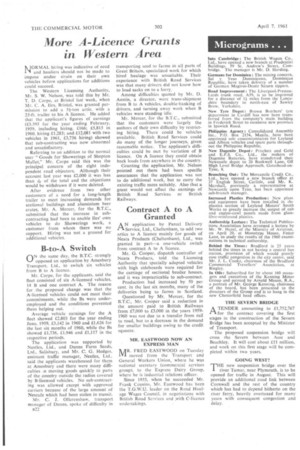More A-Licence Grants in Western Area
Page 56

If you've noticed an error in this article please click here to report it so we can fix it.
MORMAL hiring was indicative of need and hauliers should not be made to impose undue strain on their own vehicles before applications for additions could succeed.
The Western Licensing Authority, Mr. S. W. Nelson, was told this by Mr. T. D. Corpe, at Bristol last week, when Mr. C. A. Iles, Bristol, was granted permission to add a 5-1-ton artic. with a 25-ft. trailer to his A licence. He added that the applicant's figures of earnings (£3,395 for the year ending February, 1959, including hiring, £166; £5,815 in 1960, hiring £1,283; and £12,081 with two vehicles in 1961, £3,736 hiring) showed that sub-contracting was now abnormal and unsatisfactory.
Referring to an addition to the normal user "Goods for Showerings of Shepton Mallet," Mr. Corpe said this was the principal concern of the eight independent road objectors. Although their account last year was £2,000 it was less than of the total and the objections would be withdrawn if it were deleted.
After evidence from two other customers of a need for a long-length trailer to meet increasing demands for sectional buildings and aluminium beer crates, Mr. A. Mercer, for the B.T.C., submitted that the increase in subcontracting had been to enable Iles' own vehicles to do Showerings work, a customer from whom there was no support. Hiring was not a ground for additional vehicles.
B-to-A Switch
Oo the same day, the B.T.C. strongly opposed an application by Amesbury Transport. Ltd., to switch six vehicles from B to A licence.
Mr. Corpe, for the applicants, said the fleet consisted of six A-licensed vehicles, 14 B and one contract A. The reason for the proposed change was that the A-licensed vehicles could not meet their commitments, while the Bs were underemployed and the conditions prevented them helping out. • Average vehicle earnings for the A fleet showed £2,803 for the year ending June, 1959, £3,142 in 1960 and £1,626 for the last six months of 1960, while the Bs showed £1,736, £1,946 and £1,117 in the respective periods.
The application was supported by Nestles, Ltd., and Dunns Farm Seeds, Ltd., Salisbury, and Mr. C. G. Hedges, assistant traffic manager, Nestles, Ltd., said the applicants warehoused for them at Amesbury and there were many difficulties in moving goods quickly to parts of the country outside the radius covered by B-licensed vehicles. No sub-contracting was allowed except with approved carriers because of the large amount of Nescafe which had been stolen in transit.
Mr. C. J. 011erenshaw, transport manager of Dunns, spoke of difficulty in B22 transporting seed to farms in all parts of Great Britain, specialized work for which hired haulage was unsuitable. Their experience with British Road Services was that many drivers did not know how to load sacks on to a lorry.
Among difficulties quoted by Mr. D. Austin, a director, were trans-shipment from B to A vehicles, double-banking of drivers, and turning away work when B vehicles were standing idle.
Mr. Mercer, for the B.T.C., submitted that the customers were largely the authors of their own difficulty by restricting hiring. There could be vehicles available. British Road Services could do many of the longer journeys, given reasonable notice. The applicant's difficulties could be met by variation of B licence. On A licence they could obtain back loads from anywhere in the country.
Granting the application, Mr. Nelson pointed out there had been specific assurances that the application was not to do additional work, but to carry the existing traffic more suitably. Also that a grant would not affect the earnings of British Road Services or British Railways.
Contract A to A Granted
ANapplication by Parcel Delivery Service, Ltd., Cheltenham, to add two artics to A licence mainly for goods of Neata Products (Cheltenham), Ltd., was granted in part—a one-vehicle switch from contract A to A licence.
Mr. G. Cooper, dispatch controller of Neata Products, told the Licensing Authority that specially adapted vehicles with high sideboards were required for the carriage of sectional broiler houses, and it was impracticable to sub-contract.
Production had increased by 50 per cent, in the last six months, many of the deliveries being to farms in Scotland.
Questioned by Mr. Mercer, for the B.T.C., Mr. Cooper said a reduction in the amount paid to British Railways from £7,000 to £3,000 in the years 19591960 was not due to a transfer from rail to road, but to a decrease in the demand for smaller buildings owing to the credit squeeze.
MR. EASTWOOD NOW AN EXPRESS MAN MR. FRED EASTWOOD on Tuesday moved from the Transport and General Workers Union, where he was national secretary (commercial services group), to the Express Dairy Group, where he is industrial relations officer.
Since 1955, when he succeeded Mr. Frank Cousins, Mr. Eastwood has been the T,G.W.U. leader on the Road Haulage Wages Council, in negotiations with British Road Services and ,with C-licence undertakings. ATHE SEVERN BRIDGE TENDER amounting to £1,752,767 for the contract covering the first stages in the construction of the Severn Bridge has been accepted by the Minister of Transport.
The proposed suspension bridge will cross the Severn between Aust and Beachley. It will cost about £11 million, and work on this first stage will be completed within two years.
GOING WEST?
THE new suspension bridge over the river Tamar, near Plymouth, is to be opened for traffic in August. This will provide an additional road link between Cornwall and the rest of the country
which has had to depend hitherto on the river ferry, heavily overtaxed for many years with consequeat congestion and delay.




























































































































































